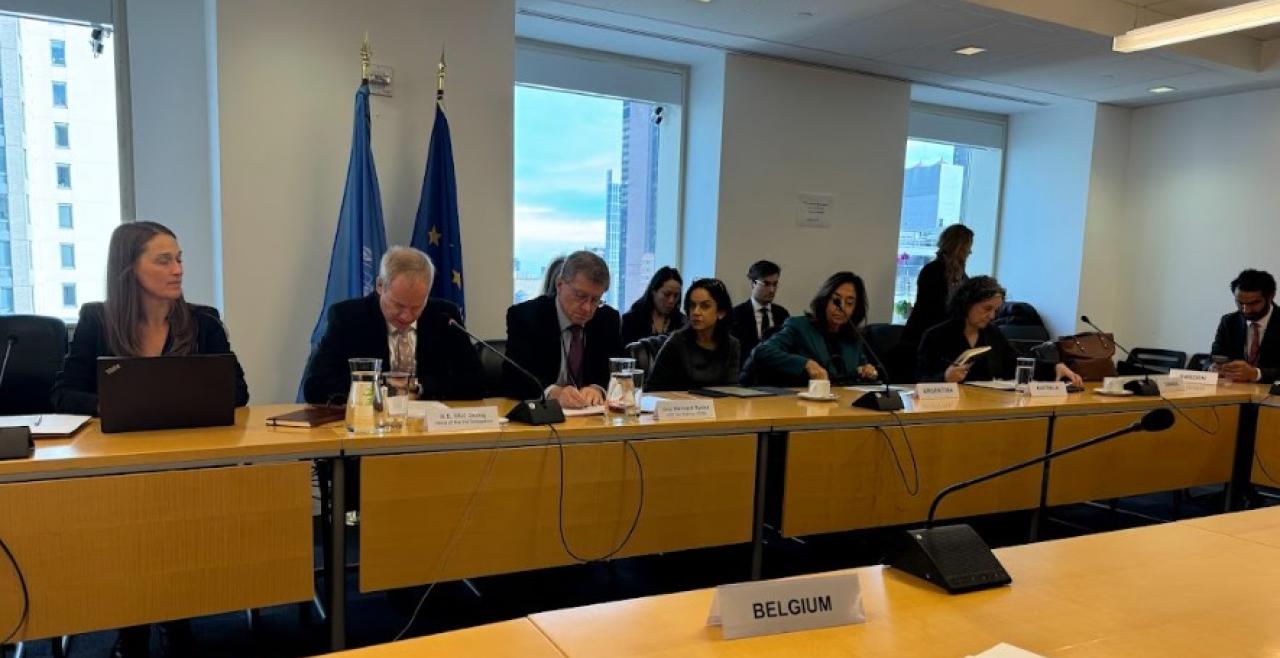Group of Friends meets to discuss engaging men and boys in ending gender-based violence

NEW YORK, United States - On 14 December 2023, the Group of Friends for the Elimination of Violence against Women and Girls met to discuss strategies and best practices for engaging men and boys in the push to eliminate gender-based violence.
The meeting was moderated by EU Ambassador to the UN Olof Skoog, who thanked members for their participation over the years and expressed gratitude that many male colleagues had joined the discussion. “We are operating in society and in power structures that are very masculine… and we have to take responsibility for it,” he said.
“Spotlight Initiative, which I established, has reached two million men and boys and mobilized male leaders as champions [of change].” - UN General Secretary António Guterres
The meeting opened with a video message from UN General Secretary António Guterres, who said that while “women and girls are leading the fight [to eliminate violence], men and boys are key.”
He continued: “Spotlight Initiative, which I established, has reached two million men and boys and mobilized male leaders as champions [of change].”
UN Under-Secretary-General for Policy Guy Ryder said that mounting global crises had led to the erosion of hard-won rights and that the persistence of gender-based violence was preventing the world from achieving the Sustainable Development Goals.
He also emphasized that change was possible: “Since 2019, Spotlight Initiative has contributed to nearly 500 laws and policies being signed or strengthened to end violence against women and girls. The amount allocated to end gender-based violence in national budgets increased tenfold across 14 countries in which the Initiative has invested. Millions of women have accessed gender-based violence services through the Spotlight Initiative, saving lives and strengthening civic space.”
He welcomed Bangladesh as the 96th member of the Group of Friends.
Co-Director of MenEngage Global Alliance and Member of the Spotlight Initiative Civil Society Global Reference Group, Laxman Belbase, said that “men and boys need to be seriously engaged and reflect on our privilege, which we have been enjoying for centuries”. He added that “working with men and boys is increasingly recognized as an important strategy within the feminist justice movement” and that “the conversation has shifted from ‘why do we need to work with men and boys?’ to ‘how?’”
A representative of Argentina emphasized that violence and discrimination “are the result of a process that begins early in the lives of boys and men, who are part of a culture that promotes and endorses these practices.” She said that Argentina was seeking to change this through the design and implementation of public policies, education and a national plan for addressing gender-based violence.
"The conversation has shifted from ‘why do we need to work with men and boys?’ to ‘how?’” - Co-Director of MenEngage Global Alliance Laxman Belbase
A representative from Canada shared his country’s experience of grappling with a Royal Commission into murdered and missing Indigenous women, and the need to examine how race and gender intersect. He said that the Canadian mission had also adopted a gender pledge that could be adapted or adopted by other missions.
Spotlight Initiative “has played a crucial role by offering targeted training to prevent violence perpetrated by men, femicide for example,” said a representative of Mexico. She added that guiding frameworks like a feminist foreign policy had contributed to awareness and action.
A representative from Luxembourg said that his country had done a study on the role of negative stereotyping about women and found that nationally, this was one of the main root causes of violence against women and girls. This had led to the development of a national action plan to fight gender stereotyping in the media and advertising, among other initiatives.
A representative from Mongolia said that Mongolia had been amplifying Spotlight Initiative’s work on policies and programmes to eliminate all forms of discrimination and violence against women and girls. This included strengthening shelters, one-stop centres, raising education levels and reducing poverty.
“Engaging men and boys is not merely a side note in our pursuit of gender equality and ending violence but a strategic imperative,” said another representative. “Men and boys need to be encouraged to question and challenge gender stereotypes” through education, positive role models, engagement of the media and digital influencers, among other strategies.
A representative of Cyprus said there was a need for a strong legislative framework, prevention policies and programmes as well as education and media sensitization. “Cyprus has integrated femicide into the criminal code as a distinct crime rendering gender-related killing as an aggravating factor when imposing sentences.”
“Don’t heal the symptom, heal the sickness,” said a representative of Belgium. ”If we want to tackle gender-based violence against women we need to be multidimensional and look at gender equality and participation of men and women all across the board.” This approach also required economic support, legal support, psychological support and a survivor-centred approach and bodily autonomy.
A representative of El Salvador said that the country had worked with sports commentator Fernando Palomo to help men see that they have a role in ending violence against women and girls, while a representative from Iceland said that the country had been implementing the ‘Barbershop’ He for She model to equip men and boys to become positive agents of change.
A Representative of Maldives said the country had welcomed new legal instruments, including the Domestic Violence Prevention Act, Sexual Harassment Prevention Act and Sexual Offences Act as well as the Gender Equality Act. “This has helped to reshape our societal norms to a large extent. Marital rape is now a criminal offence.”
